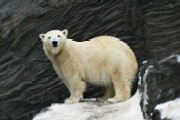Polar Bears
Dirk Kempthorne, U.S. Secretary of the Interior, announced in May that the polar bear has been listed as threatened, thus protected by the Endangered Species Act. The protection is somewhat watered down since the Interior Department included provisions allowing for continued oil and gas development in polar bear habitats. By 2008, the estimated number of polar bears left in the wild was about 20,000.
Reducing Greenhouse Emissions
The Group of 8 nations —U.S., Japan, Germany, Britain, France, Italy, Canada, and Russia — set goals in July that by 2050 they will have reduced by half the amount of greenhouse gases each country emits into the environment. The agreement was criticized by environmental groups for being vague and lacking specific targets for reducing emissions. There was also confusion about what emissions baseline countries will use to meet their 50% reduction goal. Some believe discussions of a 50% reduction by 2050 should be based on emission levels in 1990. Others argue the baseline should be based on current levels.
Trans-Fat Ban
California became the first U.S. state to ban the use of trans fats by restaurants and food retailers. Trans fats, or hydrogenated oils, are used in processed foods to increase their shelf life. Trans fats are also linked to coronary heart disease. California has 88,000 restaurants that will be affected when this law goes into effect by 2010. California Governor Arnold Schwarzenegger said the new law was a “strong step toward creating a healthier future.” Any restaurant violating the new law will incur fines from $25 to $1,000.
China’s First Spacewalk
In September, Zhai Zhigang became the first Chinese astronaut to perform a spacewalk for China’s burgeoning space program. Zhai spent 20 minutes performing an extra-vehicular activity (EVA) in space, enough time to venture out of the craft in order to retrieve a test sample placed outside the orbiter. This achievement makes China the third nation to successfully perform EVAs, after the United States and Russia. See this slideshow about firsts in space for more information.
World’s Largest Science Experiment
The world’s largest and most powerful particle collider was activated for the first time in September. Built outside of Geneva, Switzerland by CERN Laboratories, an organization funded by 20 nations, the Large Hadron Collider is the most expensive and sophisticated science project ever undertaken. Physicists hope the LHC will help solve such mysteries as the origin of mass.
More from Roundup of Recent Science Discoveries
